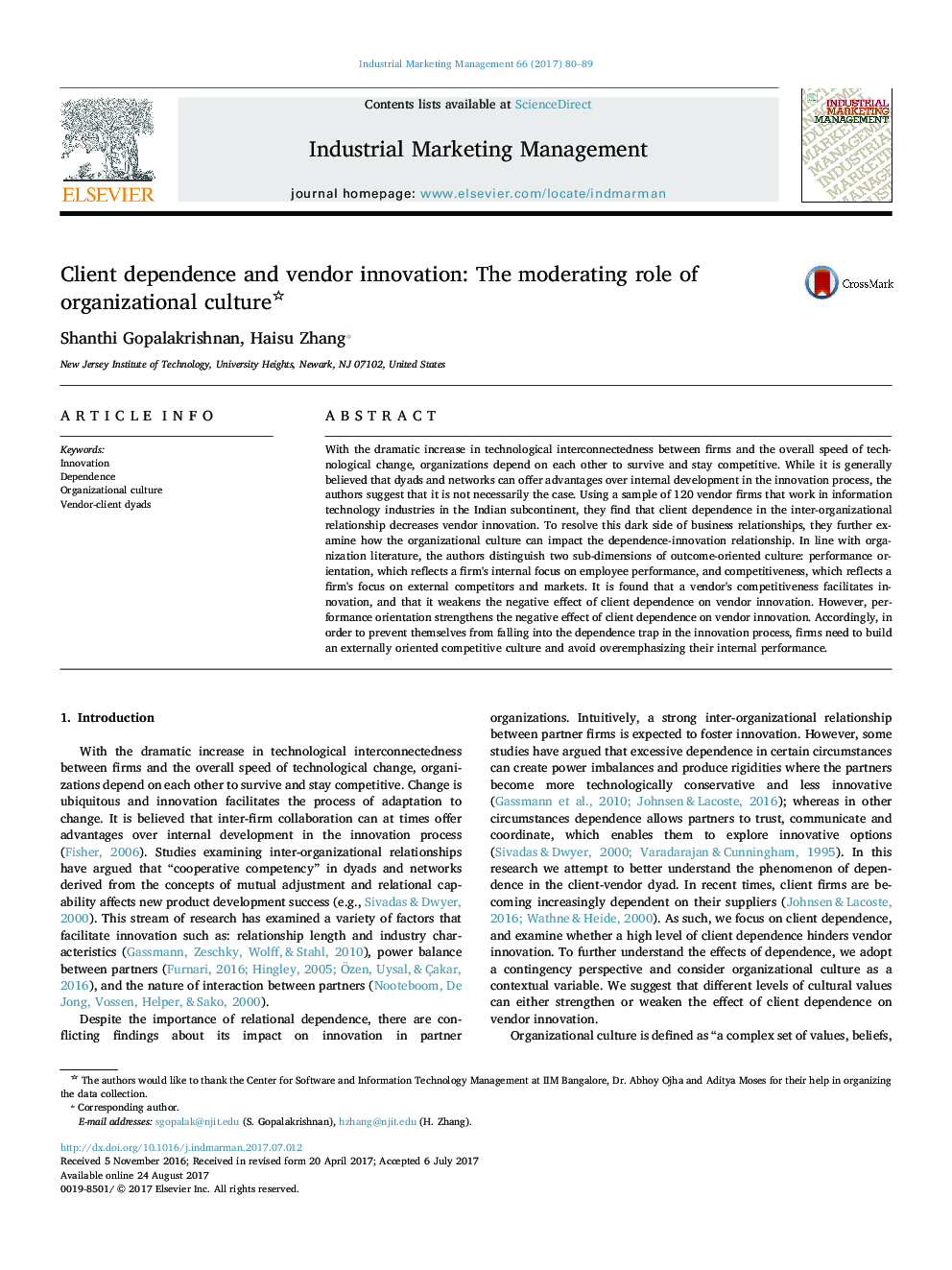| کد مقاله | کد نشریه | سال انتشار | مقاله انگلیسی | نسخه تمام متن |
|---|---|---|---|---|
| 5111022 | 1483436 | 2017 | 10 صفحه PDF | دانلود رایگان |
عنوان انگلیسی مقاله ISI
Client dependence and vendor innovation: The moderating role of organizational culture
ترجمه فارسی عنوان
وابستگی مشتری و نوآوری سازنده: نقش تعدیل کننده فرهنگ سازمانی
دانلود مقاله + سفارش ترجمه
دانلود مقاله ISI انگلیسی
رایگان برای ایرانیان
کلمات کلیدی
نوآوری، وابستگی، فرهنگ سازمانی، مشتری های فروشنده
ترجمه چکیده
با افزایش چشمگیر در ارتباطات تکنولوژیکی بین شرکت ها و سرعت کلی تغییرات تکنولوژیکی، سازمان ها به یکدیگر وابسته هستند تا بتوانند در برابر رقابت باقی بمانند و باقی بمانند. در حالی که به طور کلی اعتقاد بر این است که دیودها و شبکه ها می توانند مزایای بیش از توسعه داخلی در فرآیند نوآوری داشته باشند، نویسندگان پیشنهاد می کنند که لزوما این مورد نیست. با استفاده از نمونه ای از 120 شرکت فروشندگان که در صنایع فناوری اطلاعات در شبه قاره هند کار می کنند، آنها دریافتند که وابستگی مشتری به روابط بین سازمانی نوآوری فروشندگان را کاهش می دهد. برای حل این نگرش تیره از روابط تجاری، آنها بیشتر بررسی می کنند که چگونه فرهنگ سازمانی می تواند رابطه روابط وابستگی-نوآوری را تحت تاثیر قرار دهد. در راستای ادبیات سازمان، نویسندگان دو زیرمجموعه فرهنگ نتیجه-گرا را تشخیص می دهند: جهت گیری عملکرد، که نشان دهنده تمرکز داخلی شرکت بر عملکرد کارکنان و رقابت است، که نشان دهنده تمرکز شرکت بر رقبای خارجی و بازار است. یافته شده است که رقابت پذیری فروشنده، نوآوری را تسهیل می کند و تأثیر منفی وابستگی مشتری به نوآوری فروشنده را تضعیف می کند. با این حال، جهت گیری عملکرد، تأثیر منفی وابستگی مشتری به نوآوری فروشنده را تقویت می کند. بر این اساس، برای جلوگیری از افتادن به تله وابستگی در روند نوآوری، بنگاهها باید یک رقابت رقابتی خارجی ایجاد کنند و از اجتناب از تمرکز بر عملکرد داخلی خود جلوگیری کنند.
موضوعات مرتبط
علوم انسانی و اجتماعی
مدیریت، کسب و کار و حسابداری
بازاریابی و مدیریت بازار
چکیده انگلیسی
With the dramatic increase in technological interconnectedness between firms and the overall speed of technological change, organizations depend on each other to survive and stay competitive. While it is generally believed that dyads and networks can offer advantages over internal development in the innovation process, the authors suggest that it is not necessarily the case. Using a sample of 120 vendor firms that work in information technology industries in the Indian subcontinent, they find that client dependence in the inter-organizational relationship decreases vendor innovation. To resolve this dark side of business relationships, they further examine how the organizational culture can impact the dependence-innovation relationship. In line with organization literature, the authors distinguish two sub-dimensions of outcome-oriented culture: performance orientation, which reflects a firm's internal focus on employee performance, and competitiveness, which reflects a firm's focus on external competitors and markets. It is found that a vendor's competitiveness facilitates innovation, and that it weakens the negative effect of client dependence on vendor innovation. However, performance orientation strengthens the negative effect of client dependence on vendor innovation. Accordingly, in order to prevent themselves from falling into the dependence trap in the innovation process, firms need to build an externally oriented competitive culture and avoid overemphasizing their internal performance.
ناشر
Database: Elsevier - ScienceDirect (ساینس دایرکت)
Journal: Industrial Marketing Management - Volume 66, October 2017, Pages 80-89
Journal: Industrial Marketing Management - Volume 66, October 2017, Pages 80-89
نویسندگان
Shanthi Gopalakrishnan, Haisu Zhang,
